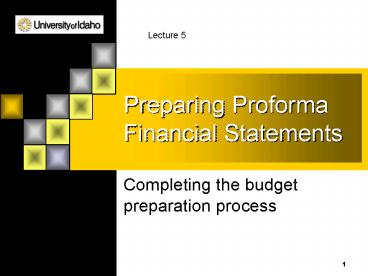Preparing Proforma Financial Statements - PowerPoint PPT Presentation
1 / 20
Title:
Preparing Proforma Financial Statements
Description:
Ex 7 and Ex 8 two cases on page 84. Essay questions. Prepare to discuss in class ... slack, and create ethical dilemmas by overemphasizing budget accomplishment ... – PowerPoint PPT presentation
Number of Views:106
Avg rating:3.0/5.0
Title: Preparing Proforma Financial Statements
1
Preparing Proforma Financial Statements
Lecture 5
- Completing the budget preparation process
2
Proforma Income Statement
- Proforma IS can be prepared once we have budgeted
sales, production, overhead and other support
costs - Proforma means it is a forecast and not yet a
fact
3
Interrelated Budgets
4
Watch out for
- If disbursement budget rather than an expense
budget is used to prepare proforma income
statement
- Add noncash expenses
- Remove cash outlays for long-lived assets,
repayment of long-term debt, dividends, etc.
5
Proforma Income Statement
- We may need to complete the cash budget before
finalizing proforma I/S - Interest expense
- Interest revenue and dividends from investments
- Income taxes estimates will be affected if
interest expense and investment income are added
to operating budgets
6
Proforma Balance Sheet
- The last statement to be prepared
- Determine ending balances in A/R, A/P,
Inventory, etc. from cash budget - Determine increases in PPE from disbursements
for capital expenditures - Compute accd depreciation by adding depreciation
expense from proforma I/S - Compute ending Retained Earnings by adding
proforma net income less planned dividends
7
Who prepares proforma financial statements?
8
At the minimum
- The cash budget is ESSENTIAL to avoid growing the
company into bankruptcy! - Remember True Sound example in module
9
Beyond Budgeting
- Is traditional budgeting the only way to go?
10
Traditional Budgeting
11
Beyond Budgeting
12
Rolling forecasts whats needed
- A focus on fewer data elements and less
information - Cascading of firm top-down targets
- Effective and timely management reporting
(typically technology enabled) - Philosophical change on how to manage, view and
compensate performance
13
Rolling forecasts are . . .
- Appropriate when
- Planning, budgeting and forecasting are
integrated - Company faces highly dynamic external environment
- Inappropriate when
- Existing system is not integrated
- Corporate culture demands detailed information
and is slow to react
Reference Omar Aguilar, How Strategic
Performance Management is Helping Companies
Create Business Value, Strategic Finance, January
2003.
14
Lessons Attributes
- Technical, Behavioral and Cultural Issues
15
Before we continue, lets review
- The objectives of budgeting
- Attributes
- Technical attributes
- Cultural attributes
- Behavioral attributes
- Lessons learned
16
Objectives of budgeting
- To force planning on a regular basis
- To provide a basis for evaluating performance
- To achieve coordination of activities through
communication about objectives
17
Lets review the attributes
- This material is at the end of each of the
modules youve used in Acct 310 and Acct 311
18
Technical Attributes
- Decision Relevance
- Process Understanding
19
Cultural Behavioral
- Cultural similar to those we discussed for
capital budgeting - Behavioral impact of budgeting can be both
positive and negative
20
Budgets Behaviors
- The impact of budgets on people
- Means of coercion
- Bad attitudes (low morale)
- Too tight or too loose
- Participation might lead to commitment
- The impact of people on budgets
- Padding budget
- Over-estimate costs
- Under-estimate revenues
- Focus on short-term instead of long-term
strategic interests
21
Lessons Learned
- See pages 78-79 in text for a list of lessons
learned good review material! - For example key points include
- Annual budget is part of long-term strategic
planning process - Budget is driven by sales forecast
- Budgeting involves many individuals and requires
substantial time and effort
22
Practice Problems Set 9
- Ex 7 and Ex 8 two cases on page 84
- Essay questions
- Prepare to discuss in class
- Come with brief written notes regarding solution
- Nothing to turn in
- Due Tues, Mar. 1
- Preparation earns attendance points!
23
The Project
- You should now be ready to start work on
sensitivity analysis. - I suggest you use the Excel sheet with formulas
that I sent by email if there is any question as
to whether your own has all the correct formulas. - The completed project is due March 3 (Thursday)
but will be accepted through Tuesday March 8 by
1200 Noon - Since I want to post the solution so you can
study it before the exam, NO LATE ASSIGNMENTS can
be accepted
24
Supplemental Materials
- Lessons Learned - Budgeting
25
Lessons Learned (from module)
- Annual budgets are part of an organizations
long-term strategic and profit plans. Budgets
link short-term management objectives to
long-term strategic objectives of an
organization. - Annual budgets are an early warning system for
identifying problems that may derail efforts to
achieve strategic goals - Annual budgets take 5-7 months to prepare and
involve many organizational participants at all
levels
26
Lessons Learned (from module)
- Annual budgets take 5-7 months to prepare and
involve many organizational participants at all
levels - The sales forecast is the driver that starts
detailed budget preparations - Budget preparation requires activity analysis,
estimation of resources needed for activities,
and translation of resources into costs
27
Lessons Learned (from module)
- Budgets reflect resources acquired and not
resources needed. Organizations acquire excess
resources to meet long-term needs, because of
cost indivisibility, or because of an inability
to operate at full capacity. - Budgets help achieve effective resource
allocation by funding strategically necessary
activities
28
Lessons Learned (from module)
- Well designed budgeting systems can motivate
desired behaviors and reinforce ethical values of
information sharing - A budget process can encourage dysfunctional
behaviors, such as budgetary slack, and create
ethical dilemmas by overemphasizing budget
accomplishment































